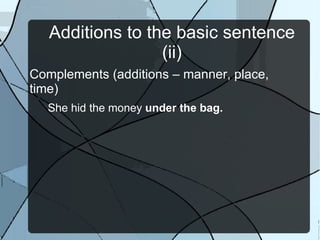The Sentence
- 1. THE SENTENCE
- 2. The basic sentence A sentence is a group of words that contains a subject and a verb, and expresses a complete idea.
- 5. (…)
- 6. Additions to the basic sentence (i) The sentence may also contain: Direct and indirect objects: Dave wrote a letter to me Describing words (adjectives and adverbs): I could not lift the heavy box.
- 7. I lifted the box easily . Time expressions: I usually phone my grandparents once a week.
- 8. Additions to the basic sentence (ii) Complements (additions – manner, place, time) She hid the money under the bag.
- 9. The 3 main kinds of sentences Simple sentences He could not move the rock. Compound sentences (2 simple joined by a conjunction) He tried hard BUT he could not move the rock. Complex sentences I enjoyed the film WHICH we saw last night.
- 10. Word Order The word order of an English sentence is very fixed. SUBJECT VERB OBJECT (S) ADDITIONS Diana The children They I is seemed visit will return their cousins it to you a good student very happy yesterday every summer next week
- 11. Word Order (ii) Never separate the verb from its object(s). We CANNOT say: They visit every summer their cousins. Time expressions can also come at the beginning of the sentence. Every summer they visit their cousins.
- 12. Punctuation A sentence must begin with a capital letter and end with a full stop (.), a question mark (?) or an exclamation mark (!).
- 13. We put a comma (,) between items in a list, but not before the words and or or He suddenly stopped talking, turned and started to run.
- 14. You may order coffee, tea, orange juice or lemonade.







